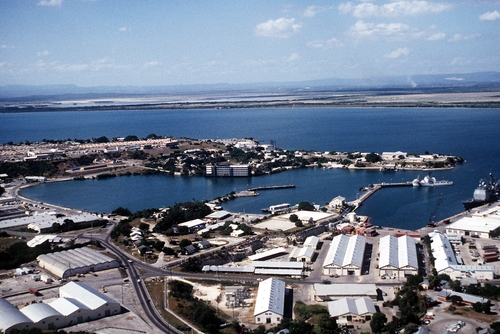DC Circuit says Guantanamo judge created 'intolerable cloud of partiality' and tosses his rulings

Aerial view of the U.S. Naval Station at Guantanamo Bay, Cuba.
On Tuesday, a federal appeals court tossed every pretrial ruling issued in the last 3½ years by a Guantanamo judge in the case of an accused terrorist.
The U.S. Court of Appeals for the District of Columbia Circuit said Air Force Col. Vance Spath created “an intolerable cloud of partiality” when he pursued a job as an immigration judge at the same time that he was issuing rulings, Politico reports. Just Security also has coverage.
The D.C. Circuit voided Spath’s orders in the case of Saudi national Abd al-Rahim Hussein Muhammad al-Nashiri, who was accused of orchestrating the al-Qaida attack on the USS Cole.
Any orders entered after November 2015, the date that Spath applied to be an immigration judge, will be voided “to scrub the case of judicial bias,” the appeals court said.
The D.C. Circuit also voided decisions in appeals of Spath’s orders by the U.S. Court of Military Commission Review.
The government is seeking the death penalty for al-Nashiri. “We do not take lightly the crimes that al-Nashiri stands accused of committing,” the appeals court said. “To the contrary, the seriousness of those alleged offenses and the gravity of the penalty they may carry make the need for an unimpeachable adjudicator all the more important.”
Just Security editor Steve Vladeck, a law professor at the University of Texas, calls the decision “a stunning rebuke,” while Politico calls it “a blistering opinion.”
Spath had neglected to tell the parties about his employment search. Prosecutors also refused to investigate, deeming the allegation that Spath was pursuing a job as an immigration judge to be nothing more than “unsubstantiated assertions.”
Less than a week later, a September 2018 Associated Press photo showed Spath at a welcoming ceremony for immigration judges.
Judge David Tatel wrote the decision for the unanimous panel. The court said Spath shared blame with others in the military commissions process.
“Although a principle so basic to our system of laws should go without saying, we nonetheless feel compelled to restate it plainly here: Criminal justice is a shared responsibility,” Tatel wrote.
“Yet in this case, save for al-Nashiri’s defense counsel, all elements of the military commission system—from the prosecution team to the Justice Department to the CMCR to the judge himself—failed to live up to that responsibility.”
Spath had applied for the job in November 2015 and was offered employment in November 2017. Spath sought a May 2018 start date because it would take time to transfer his responsibilities at Guantanamo Bay to another judge.
While start date negotiations continued, “a separate drama involving al-Nashiri’s defense team was unfolding in Guantanamo,” Tatel wrote.
The chief defense counsel for the military commission raised concerns that lawyers’ attorney-client meetings were being monitored, leading al-Nashiri’s defense lawyers to seek more information. While their discovery motion was pending, a microphone was discovered in a meeting room, said by the government to be a nonfunctioning “legacy microphone.”
Spath denied discovery. Fearing their continued representation of al-Nashiri could compromise their duty of confidentiality, three of four defense lawyers sought leave to withdraw. Spath found that there was no good cause for the lawyers’ withdrawal. They withdrew anyway.
Spath continued to rule on matters, although the only lawyer remaining on the case had only five years of experience and no meaningful capital litigation experience. The lone defense lawyer declined to participate in the proceedings.
In February 2018, Spath ordered prosecutors to draft writs of attachment to arrest two of the defense lawyers for their failure to appear and continue their representation. The lawyers were civilian employees of the Defense Department. (The third lawyer who quit had been recruited by the American Civil Liberties Union.)
That same month, Spath learned he could start work as an immigration judge in July. Spath said he was abating the proceedings to await a decision by another authority and also said he was considering retirement.
The Court of Military Commission Review affirmed in October 2018 that the record showed no good cause for the defense counsels’ withdrawal.
A replacement judge was named, but her tenure “did not last long,” the D.C. Circuit said. She also had applied for a position as an immigration judge.
Todd Toral, a Jenner & Block partner, is providing pro bono representation to Mary Spears and Rosa Eliades, the two Defense Department civilian lawyers who withdrew in the case.
Toral told the ABA Journal that the D.C. Circuit opinion represents vindication for his clients, who sought to uphold ethical ideals in their withdrawal.
The two lawyers had intervened in the case and asked the D.C. Circuit to vacate the CMCR’s opinion that they were obligated to continue as al-Nashiri’s lawyers. Because the appeals court vacated all decisions by both Spath and the CMCR, the lawyers obtained the relief they requested.
Although the appeals court voided orders adverse to the lawyers, Toral says, a different order remains in effect: an order by the chief defense counsel for the military commissions that permits their withdrawal.
Toral also points to a passage in Tatel’s opinion addressing concerns that Spath’s rulings could have created ethics problems for Spears and Eliades.
“We cannot imagine that any state bar association or other professional licensing body—especially once presented with this opinion—would initiate disciplinary proceedings against lawyers based solely on the orders of a judge ethically disqualified from issuing them,” Tatel wrote.
Hat tip to @steve_vladeck and @ZoeTillman.
See also:
ABA Journal: “Is controversial Guantanamo judge now an immigration judge? Defense asks to throw out his rulings”
ABA Journal: “Legal ethics questions and accusations of spying on the defense have stymied a Guantanamo terrorism trial”
ABA Journal: “Second judge in a row leaves USS Cole case to join immigration court”
ABAJournal.com: “Developments in Guantanamo detainee’s case point to an uncertain future”



